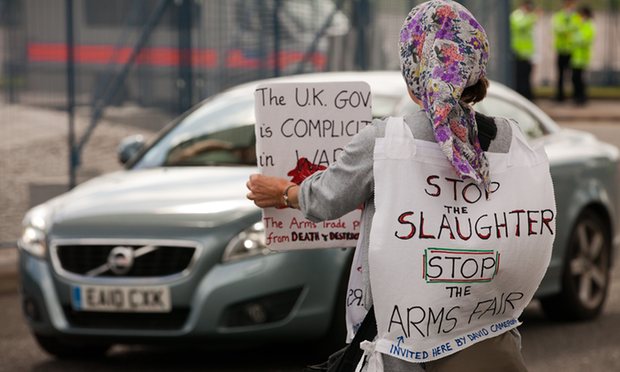Isa al-Aali is one of eight people on trial over protests at international arms fair in London last year

A Bahraini activist has told a London court that he blocked a lorry from entering an international arms fair to prevent people from being killed in the future.
Isa al-Aali, 21, who was granted asylum in the UK last year, denied breaking the law. He told Stratford magistrates court in east London that he was “expressing himself” and had a duty to stop the arms trade.
Aali, who spoke through an interpreter, is one of eight defendants who deny wilful obstruction of the highway in relation to protests at the the Defence and Security Equipment International (DSEI) fair at the ExCeL centre in London’s Docklands last September.
All have claimed they acted to stop greater crimes being committed by regimes represented at the fair, which included Azerbaijan, Bahrain, Israel, Pakistan and Saudi Arabia. It is believed to be the first time such a defence has been used to defend protests against an arms fair in Britain.
The stories you need to read, in one handy email
Read more
Aali gave a robust defence of his actions, telling the court: “I am against arms sales because the Bahraini regime gets arms through this fair and I was a victim. Our people are being victimised by the regime, which is being supported by the UK through the sale of arms.”
On the day of the demonstration, Aali lay down in the road to block a lorry from getting into the fair, which is attended by more than 30,000 people over several days.
“I went in front of the lorry and sat on the ground,” he told the court. “That lorry was likely to be carrying arms to kill innocent people. The police, they came and spoke to me. I told them they should talk to the criminals causing problems in the world, not me.”
Despite his action Aali said he had not obstructed traffic.
Advertisement
“The traffic did not stop completely,” he said. “Vehicles were able to pass by. Lying down in the middle of the road is a continuation of my freedom of expression and unhappiness with the arms fair.”
Aali drew a link between the arms fair and what he had experienced in Bahrain during the 2011 protests, when the government used strong-arm tactics to crush dissent. He said he had been arrested three times, beaten up and claimed that police threatened to cut off his penis with a knife.
Caoimhe Daly for the prosecution argued that Aali had taken matters into his own hands. “It is one thing to express yourself on the side of the road, it is another running into the middle of the road and stopping a lorry. You are interfering in normal use of the road.”
When she put it to him that he did not know if that vehicle would be used to commit a crime, he drew laughs by replying: “It’s not going to be used to be put in somebody’s front garden.”
Earlier, Oliver Sprague, the programme director of arms control and policing at Amnesty International UK, provided testimony as an expert witness.
He also made the point that although arms such as bombs may be sold legally, it becomes illegal if that bomb is used in violation of international humanitarian law. He told the court that by September 2015 at the time of the DSEI exhibition, there was widespread documentation of war crimes from all sides in the Yemen conflict, but particularly by the Saudi-led coalition.
Saudi Arabia has led a coalition aiming to put down a rebellion by Houthi rebels, who it claims are supported by Iran. A UN report leaked to the Guardian in January found “widespread and systematic” targeting of civilians in the Saudi-led strikes, and identified 2,682 civilians killed in such strikes.
Advertisement
“Numerous credible sources, including the UN have documented, particularly through aerial bombardment, grave violations of international humanitarian law using the very large plethora of sophisticated weaponry displayed at DSEI,” Sprague told the court.
“It’s lawful to sell those weapons, yes,” he said. “But it’s not legal to sell these weapons where there is a belief they could be used in committing war crimes. By May [2015] it was clear air strikes were violating international law.”
Organised every two years by Clarion events, DSEI brings governments together with many of the globe’s biggest arms companies. Critics say some of the world’s most oppressive regimes are represented.
According to Campaign Against Arms Trade, between February 2011 and September 2015 the UK licensed £45m of arms sales to Bahrain, including machine guns, sniper rifles, gun mountings, assault rifles and anti-armour ammunition.
The trial began on Monday and is expected to last five days. Aali, Thomas Franklin, Angela Ditchfield, Lisa Butler, Javier Gárate Neidhardt, Susannah Mengesha, Luis Tinoco Torrejon and Bram Vranken are on trial. The trial continues.

